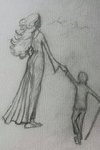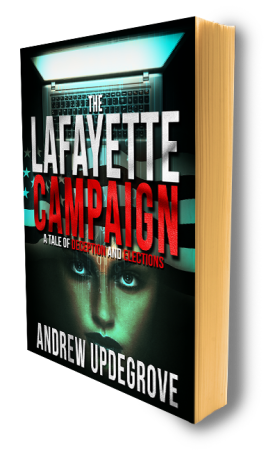 Back in July, I reviewed a fascinating new novel titled Selkie, by English author Julia Lund. I’m now pleased to present an interview with the author, in which she shares the inspirations for her work, her thoughts on defining an audience (or not), balancing lyricism with action, and more.
Back in July, I reviewed a fascinating new novel titled Selkie, by English author Julia Lund. I’m now pleased to present an interview with the author, in which she shares the inspirations for her work, her thoughts on defining an audience (or not), balancing lyricism with action, and more.
Q: The setting for Selkie is essential to the plot, the scenery, the atmosphere, the cultural background – everything – suggesting that you have a deep attachment to the coast of Scotland. If that’s the case, can you tell us something about your own history and connections with the book’s setting?
A: I was born and brought up in the north of England, just a few miles from the border with Scotland. As a family, we often spent weekends having picnics along the nearby Solway coast. Just across the estuary, when the coastline wasn’t looking misty and mysterious, Scotland seemed near enough to touch. ‘Proper’ holidays were few and far between, but a couple of the most memorable were spent on the west coast of Scotland. The area has always held a special part of my heart.
Q: Was Selkie mythology something that you absorbed early in life, or did you come upon it later? Either way, was it simply a convenient plot device, or did the legends resonate with you personally?
A: I didn’t learn to read until much later than my peers; words on a page were mysteries for other people. And then one day, that changed. Things suddenly clicked and there was no stopping me. I read anything and everything, but particularly loved mythology and fantasy. I don’t specifically remember reading about selkies, though I was entranced by mermaids.
 My research into the Celtic myths and folklore surrounding the seal people came as a result of a sketch of a young woman I doodled one night about three years ago. I knew she had a secret that was to do with the sea, that it involved love and loss and that it happened on the west coast of Scotland. My job then was to discover just what lay at the heart of her secret. As soon as I discovered selkies, I knew they were the key.
My research into the Celtic myths and folklore surrounding the seal people came as a result of a sketch of a young woman I doodled one night about three years ago. I knew she had a secret that was to do with the sea, that it involved love and loss and that it happened on the west coast of Scotland. My job then was to discover just what lay at the heart of her secret. As soon as I discovered selkies, I knew they were the key.
Q: I was startled by the ending of the continuous plot line, before the epilogue chapters. Did you have any hesitation about bringing the immediate narrative to a close in this fashion? It would have been so easy to have taken another way out, arguably while still achieving the same contemplative resolution? Why did this particular resolve seem to be necessary (I’m trying to avoid a spoiler here, so feel free to do the same with your answer)?
A: I’m sure I could have structured the story differently, and I did consider it, but what happens is so life-altering that I felt the emotional impact needed to be immediate and definitive, not a gentle journey. I always knew what the fates of the characters were, but let’s just say that some developments are sudden and unexpected, just as in real life. It’s difficult to say much more without referring to specifics of the plot.
Q: J.K. Rowling’s success in attracting adults to her ostensibly young adult fiction has made it “respectable” for adults to read books that their children may have brought home. Certainly your work can be appreciated by an adult audience as well. Do you think that an author needs to make compromises to appeal to both audiences, or is it easy to feel satisfied taking a middle path?
A: I wouldn’t say I take a middle path, I just write the stories that won’t let go of me. I read a statistic recently that says the majority of YA fiction is read by the over thirties. My readers seem to range in age from around fourteen to seventy-six (the oldest I’m aware of) and span both sexes, so anecdotally, that would seem to fit. When I first began writing, I didn’t set out to write for young adults, the first plot I had in my head centred on the relationships that shape and alter a marriage and was very much adult fiction. However, sometimes, the characters who beg you to write about them just don’t want you to tell the stories you’ve planned. No matter how I tried, I always came back to stories that involve characters aged between about sixteen and eighteen.
Q: Why do you suppose that’s the case?
A: Perhaps it’s because I’ve spent most of my working life working with that age group? Or perhaps it’s because those years when childhood is gone, but before adulthood has truly arrived, are amongst the most powerful emotionally? Well, they certainly were for me and I think many adult readers love being transported back to that brief but unforgettable time in their own lives. That’s certainly what some readers have fed back to me. I don’t feel tied to a ‘target audience’; I just write the stories that overwhelm me.
Q: I noted in my review that I thought you have a real gift for lyrical prose, and wondered whether you felt constrained to sacrifice introspection and atmosphere to the demands of keeping the action moving. Can we hope that you’ll give yourself a bit more license in this regard in your next work?
A: Thank you. My first drafts of both Selkie and my first novel, Strong as Death, were much more introspective and perhaps felt a little self-indulgent at times, so I edited them fairly ruthlessly. I think the balance between pace and description and reflection walks a fine line and perhaps I have sacrificed the latter for the former; it depends on preference I think. I suspect that my next novel will be harder to class as YA as I give myself a bit more leeway on that score. Watch this space …
Q: What might that next work be? And what other projects are you considering to follow it?
A: I’m currently working on a novel where the reader will hear from the character at seven, fourteen, twenty-one and seventy years old. It’s a little difficult to explain as it’s a fairly complex initial idea, which I am starting to mould into a coherent story. One thing I can say is that the major themes are, once again, love and loss and that there is a paranormal element in terms of time-slip and perhaps what could be categorised as Magical Realism too.
This year I also plan to start work on a novel that will revolve round a set of letters my parents wrote to each other during their teens. Although I was always aware the letters existed, I didn’t come across them until long after both my parents died. As I haven’t read them all yet – I found it too emotionally difficult when I first discovered them – I’m not sure how the book will evolve, but at the moment, I imagine it will become fiction based on fact. I have deliberately not read any more letters prior to writing this book; I am hoping the correspondence will reveal the plot to me.
Following that, I have an idea that revolves around elderly twin sisters and a secret from their youth and I am also considering writing about my own experience of losing my faith and then regaining it, so quite a range of concepts I’m considering.
* * *
You can find Selkie and Stronger than Death, Julia’s first book, at Amazon in Australia, Canada, the U.S., and the U.K. If you’d like to help spread the news about her work, consider clicking on the tweet below:
Myths, Mysteries and Coming of Age: Meet author Julia Lund
* * *


I’m pleased to say that I’ve read both Strong As Death, and Selkie, and enjoyed both immensely. I’ve been aware of Julia as a writer since before Strong As Death, and I believe she will gain a large following as her back-catalogue increases.
If anybody has read her books they would be in no doubt about how astute the author is regarding human relationships, and this excellent interview brings out more of her personality. Between the questions and answers a superb insight is gained, which will be appreciated by any who have read Julia’s work.
Great work from both of you.
Thanks, Tom, and I second everything you’ve said about Julia and her writing.
Thank you for such encouraging comments, Tom.
Reblogged this on Julia Lund and commented:
I was delighted that after reviewing my novel, Selkie, earlier this year, author Andrew Updegrove, who writes fine quality fiction, asked me if he could feature an interview with me on his blog. Here it is …
such great informative, valuable and energetic interview…well deserved!
Thank you. Andy’s questions really made me think.
This has also given me insight into your books as well as you (Julia) as a person. A good interview.
An interview is only as good as the questions and this selection caused me to pause and ponder.
Lovely interview, and Julia, am intrigued by the “seven, fourteen, twenty-one and seventy years old.” character! All the best with your writing 🙂
Thanks, Damyanti. And my next idea is intriguing me too! At the moment, it looks as though the seventy-year-old voice may grow silent (not to me, but as far as the final version goes), as I have just realised something glaringly obvious about the character …